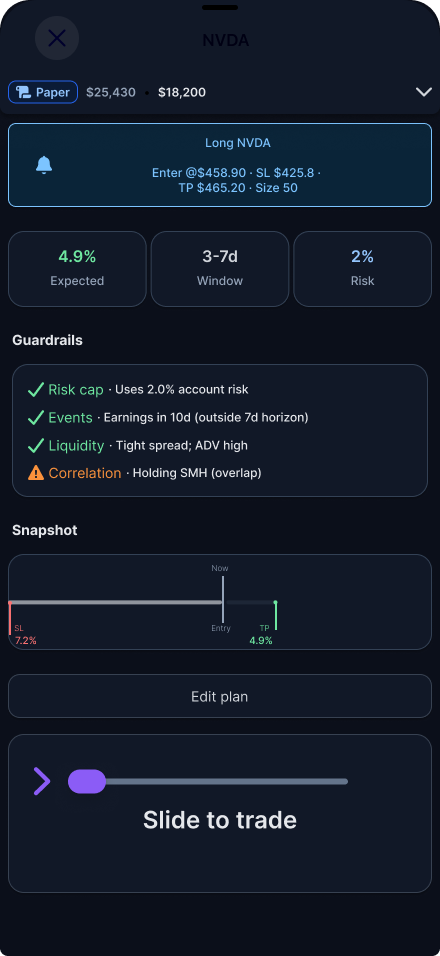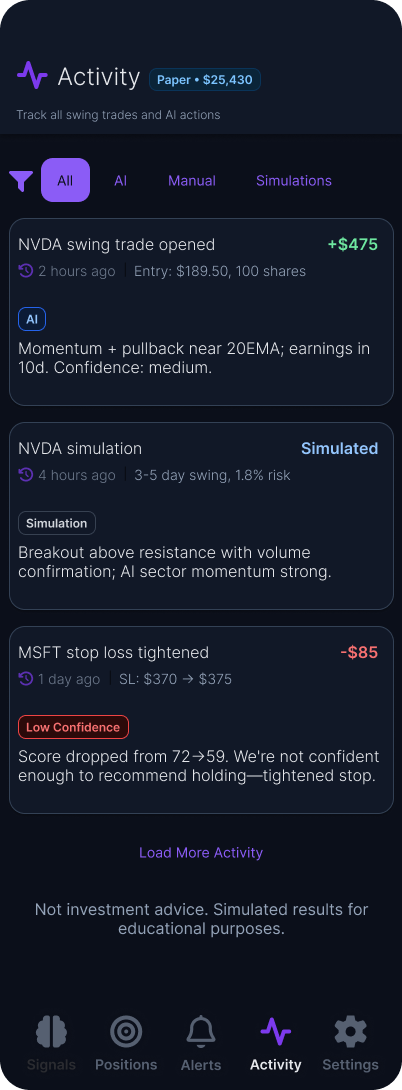
AI Swing Coach: Mobile Trading
AI UX • Fintech • Design Sprint • 5 days • Framing refinement in progress (Kellogg exec-ed)
Role: Product DesignerTeam: IC (mock data)Scope: 5 iOS screens, DS prototype
8.6/10 ease8.4/10 confidence0 switch errorsIn progress
Designed and validated a simulate-first mobile trading flow that builds trust through explainability and safe reversibility.
Problem
Swing traders face noisy signals and risky execution with low explainability, leading to hesitation or errors.
Outcome
Built an AI-native prototype with guardrails, explainability, and undo that increased confidence (8.4/10) and eliminated mode-switch errors. Currently refining packaging and GTM based on a structured product-strategy framework.
Strategic Highlights
Leadership-level framing in three pillars
Human-in-the-loop AI UX
Explainable signals, simulate-first, and undo patterns to improve trust and risk control.
Systems Design
Refactored fast prototype into DS primitives (tokens, variables) for scale and consistency.
Design Ops Speed
5-day sprint + unmoderated Maze test (n=7) to quickly validate hypotheses and ship fixes.
Results at a Glance
Quick, credible metrics with context
8.2 /10
Ease of mode switch
Guarded confirmation works
8.0 /10
Confidence in live execution
Explainability boosts trust
0
Mode switch errors
Guardrails successful
95 %
Adoption intent
Directional; small n
5 days
Cycle time
Sprint + test
What I Built
Screens and decision patterns
Insights & Impact
Why this mattered beyond the prototype
Trust & Safety
Guardrails + Undo improved confidence without slowing decisions; informed later AI-native DS patterns.
Measurable Quality
Metrics tied to hypotheses; created a template for tracking explainability & UX safety across teams.
Scalable Patterns
DS primitives + variables turned a sprint prototype into reusable, governable patterns.
Product Framing
Discovery → UX acceptance → pricing/GTM now being formalized; updates will note deltas.
Resources
Proof links for reviewers
Process (Optional Deep Dive)
Design Sprint → Findings → Changes → Next Experiments
Goals:
- Recognize high-probability signals → simulate-first.
- Safe Paper ↔ Live handoff.
- Identify which cues drive decisions more (charts vs. concise metrics).
Framing updates in progress using a structured product-strategy approach (discovery → UX acceptance criteria → pricing/GTM). Results and artifacts will note what changed.
Platform:- Maze (unmoderated), n = 7.




